Grow Your Practice

The 6 Best Dental Practice Marketing Strategies in 2024
In today’s world, the field of dentistry has become fiercely competitive. It feels like there’s a dental practice on every street corner, each one vying for the same goal: attracting more patients. The key to thriving in this saturated market is not just about being a skilled dentist, but about employing cutting-edge dental practice marketing strategies that set you apart from others in the area. In this blog, we will delve into the six best dental practice marketing strategies for 2024, designed to help you double your patient flow and stay ahead of the competition.
#1 - Google Reviews
Have you ever bought something on Amazon? Chances are you have. Maybe it was a pair of headphones, or perhaps you were just restocking on toilet paper. Amazon makes the process easy: you visit their website, type in what you want, and you’re presented with hundreds of options to choose from. But how do you decide what to buy? Every pair of headphones claims to offer exceptional sound quality, even the budget options. Without the ability to test them out, how do you know which ones to trust?
Most people turn to the reviews. Reading what other customers have to say helps you make an informed decision without the hassle of ordering multiple products and dealing with returns. The same principle applies to dentistry. When potential patients search for “dentist near me” on Google, they’re met with dozens of dental practices, each claiming to provide exceptional care and to treat patients like family. So, which one do they choose? Most patients will look at the reviews which is why getting more Google reviews is one of the best dental practice marketing strategies you can invest in.
Which dental practice would you choose?

Two pairs of headphones may both claim exceptional sound quality, but if one has 500 reviews with a 4.9 out of 5.0 rating and the other has 25 reviews with a 4.5 out of 5.0 rating, you’re probably going to choose the first option. The vast majority of potential patients use the same logic when selecting a dental practice. High ratings and numerous positive reviews can make all the difference in attracting new patients to your practice.
How do you get more reviews than your competitors?
Most dentists understand the power of Google reviews, but the question often is “how do I get more and beat my competition?” Should you print out a QR code to place at the front desk? Should you sign up for a review management tool like Swell, Trustpilot, Birdeye or any of the hundreds of other review management systems out there?
We’ve helped hundreds of dental practices across the country become the highest-reviewed practices on Google, and we can tell you that you don’t need any fancy tools or QR codes to achieve this. Think about it: when was the last time you saw a random poster with a QR code in the reception area of a hotel or business, and decided to whip out your phone to scan it and leave a review? Probably never.
Do you enjoy receiving automated text messages from businesses? Most people don’t. The vast majority of people don’t respond well to these strategies. Review management tools exist not because they create a better experience for the patient, but because many businesses want a quick fix solution for reviews—something where they just need to provide a credit card number and it takes care of everything. While these systems do work (send enough automated review requests and someone is bound to leave a review eventually), they are being used by many dental practices. As a result, all you might achieve is growing your review count at the same rate as dozens of other dental practices in the area using the same tools.
The best way to grow your review count and become the highest reviewed practice in your area is:
- Have your staff personally ask for the review.
- Build an accountability system to ensure your staff is actually asking.
- Create a reward system to incentivize them to ask.
Let’s break this down in more detail and explain why this process works so well.
Have your staff personally ask patients to leave a review
Have you ever received an event invite on Facebook or via email, something that looks like it’s being blasted out to hundreds or thousands of people? You probably have, and you’ve probably ignored it the vast majority of them. It’s not personal and often just looks and feels like spam.
 However, when someone you know, like, and trust personally invites you to an event—perhaps saying, “I’m hosting X this Saturday and it would be great if you could come!”—it becomes much harder to decline. If you agree to come, you feel a sense of obligation because you gave your word. This is why having your staff personally ask patients for a review is so powerful, instead of just blasting out review requests using a tool.
However, when someone you know, like, and trust personally invites you to an event—perhaps saying, “I’m hosting X this Saturday and it would be great if you could come!”—it becomes much harder to decline. If you agree to come, you feel a sense of obligation because you gave your word. This is why having your staff personally ask patients for a review is so powerful, instead of just blasting out review requests using a tool.
When a patient is checking out at the front desk, if your staff asks, “How was your visit today? How did everything go with Dr. John?” most patients will respond positively, saying something like, “It was fantastic. Thank you so much!”
Your staff can then follow up with:
“That’s wonderful to hear. Dr. John really wants to go above and beyond for everyone, so I’m happy you had a great visit. Say, if you have a minute, would you be willing to share your feedback about our office in a Google review? It will only take a minute. I can text you a link right now that will take you to our review page. We’d love to get more wonderful patients like you, and your feedback would help us tremendously!”
Most patients will agree and are 10-20x more likely to follow through compared to receiving an automated email or SMS from a review management tool hours or days after their appointment.
Create a system to ensure staff accountability
This strategy only works if your staff agrees to it and follows through. In practice, it’s easy for receptionists to nod their heads in agreement but then revert to their usual routines, never asking patients for reviews. Sometimes they’re overwhelmed and forget, sometimes they’re resistant to change, and sometimes they feel awkward about asking and end up not doing it at all. Accountability, or the lack thereof, is a significant issue in many dental offices, leading to missed opportunities because no one is paying attention to the day-to-day operations. Staff know it’s easy to let things slip without the dentist noticing.
So, how do you make your staff accountable for reviews? How do you ensure they follow through, have the conversation with the patient, and ask for the review? The best method we’ve found is to use a scoreboard. Introduce a competitive element, and people will rise to the challenge.
Head to your local office supply store and pick up a cheap whiteboard. Place it somewhere easily visible to your receptionists, such as the staff lunchroom, behind the front desk, or in the room where you hold team meetings.

Write down the name of your dental practice, the number of Google reviews you have, and your score out of 5. Do the same for the top 5 or 10 competing dental offices in your area with the highest review counts. Update these numbers every Monday morning and make sure your staff can see them. For example, maybe on Monday you have 67 reviews. Competitor 1 has 251, Competitor 2 has 209, and so on.
At the end of the week, repeat the process and calculate how many reviews each practice has gained. Perhaps Competitor 1 gained 5 new reviews, Competitor 2 gained 7, etc. If your staff gained more reviews than the competing offices, celebrate the victory. If not, discuss how your team can improve next week. Emphasize the importance of reviews by saying:
“This shows potential patients that these other offices are better than us. I don’t think that’s true. We do a wonderful job and have many patients who love us, but I think these other offices are better at convincing their patients to leave reviews. Let’s make this a priority and show our community that we’re a great dental practice worth visiting!”
Many clients have followed this strategy and, within weeks or months, dominated the Google review rankings to become the highest-reviewed practice in their area, without spending hundreds of dollars per month on review management tools. Becoming the highest reviewed practice in your area is one of the best dental practice marketing strategies you can employ and it’s all about educating your staff on why this is important, motivating them to stay engaged, and using a scoreboard to tap into everyone’s competitive spirit.
Create rewards and incentives to motivate your staff

Having the highest-reviewed practice in your area can do wonders for your patient flow, but when it comes to your staff, you have to ask yourself, “what’s in it for them?”
Asking patients to leave a review and sending them a link takes extra time and effort. Many receptionists already feel overwhelmed, juggling multiple tasks. How do you prevent them from feeling like this is just another item on their already overflowing to-do list?
The key is to create an incentive system so they can also share in the reward. While many clients who followed the first two strategies saw a significant increase in their review counts, we encountered offices where the staff resisted the extra effort. They claimed they were asking patients, despite evidence to the contrary. They insisted patients didn’t like the approach, even though they hadn’t tried it. They constantly sought alternatives like QR codes or review management tools to avoid putting in extra effort. The excuses were endless.
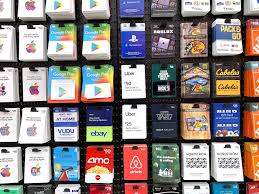 Then one day, one of our dentists brought in a stack of $5-10 gift cards for places like Starbucks and Subway. He told his staff, “I know asking patients for a review and sending them a link takes extra work, and you’re already busy. But if you manage to get us a review, I want to show my appreciation because reviews are so important for attracting more patients.”
Then one day, one of our dentists brought in a stack of $5-10 gift cards for places like Starbucks and Subway. He told his staff, “I know asking patients for a review and sending them a link takes extra work, and you’re already busy. But if you manage to get us a review, I want to show my appreciation because reviews are so important for attracting more patients.”
The stack of 75 gift cards was gone in a week! Their staff gained more reviews that week than they had in the previous year. This was not an isolated case. In an extreme example, one of our clients became the highest-reviewed practice in a large city with nearly 1,000 competing dental offices. He proposed a challenge to his staff: “If we become the highest-reviewed practice this year, I will close the practice and take everyone on a four-day all-inclusive vacation to the Dominican Republic.”
They hit the goal in less than two months, gaining more reviews in that time than in the previous three years combined. Before you think the dentist was crazy for offering such an extravagant reward, know that in the following 12 months, his practice’s production increased by over $1.3 million—the highest growth in the ten years he had owned the practice.
Incentivizing your staff not only motivates them but can also lead to substantial growth for your practice. By sharing in the rewards, your team becomes more invested in the success of the practice, leading to a win-win situation for everyone.
#2 - Patient Testimonial Videos
While reviews are a very powerful dental practice marketing strategy which can influence people to choose one product over another, especially for smaller purchases, more expensive purchases often require more in-depth reviews. Have you ever watched an unboxing video or a very in-depth review on a particular product? Many people have. When buying a car, for example, you wouldn’t just Google “best car in 2024” and choose the one with the most reviews. You’d likely do a lot more research, including watching car review videos on YouTube, to narrow down your choices and pick the best one for you.
The same goes for patients considering expensive cosmetic procedures like Invisalign or dental implants. They look for other elements of social proof beyond just Google reviews, and one of the most powerful ways you can set yourself apart is through authentic and genuine patient testimonial videos.
Consider this: you’re searching for a dentist specializing in dental implants, either for yourself or a family member. You come across dozens of practices claiming to be experts. Their websites feature dentists with numerous designations you’ve never heard of, all claiming to offer exceptional dental care and the latest implant technology. Every website seems the same. Then, you come across a practice that lets their patients do the talking. You find a video like this:
It’s not the only one either; there are dozens of videos of happy patients willing to go on camera and share their positive experiences. With one video, you might be skeptical, thinking it could be a paid actor or a family friend. But it’s hard to deny a wall filled with faces of genuinely happy patients singing the praises of the dentist.
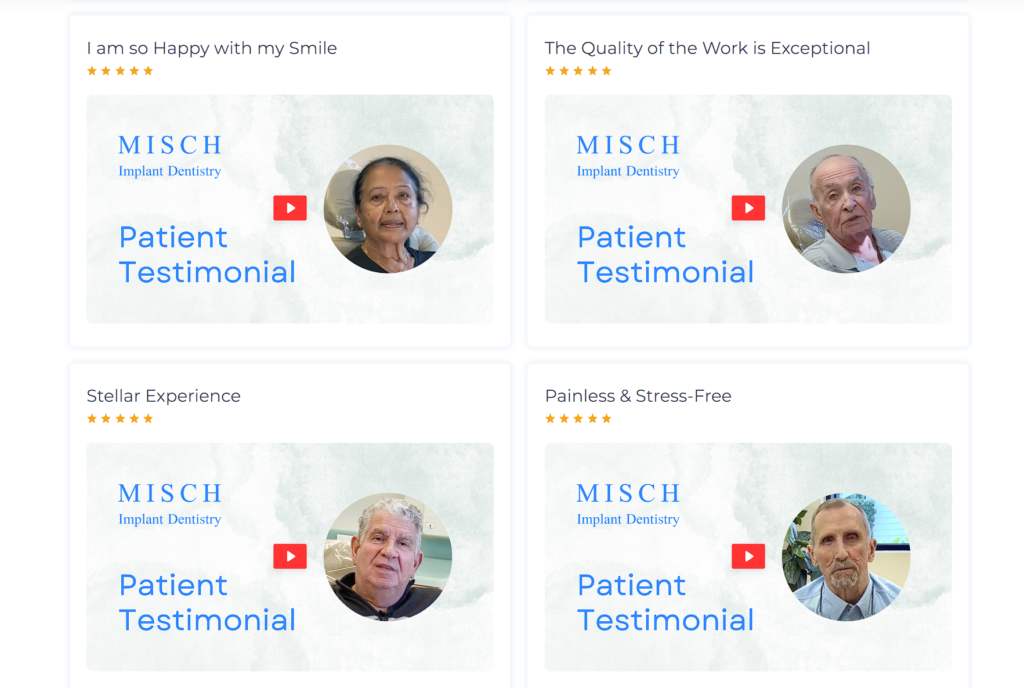
Patient testimonial videos work wonders for more than just cosmetic procedures. Imagine you’re a parent looking for a new dentist for your child. Many practices claim to be great with kids, but what if one of the practices you’re checking out has videos like this?
Who are you going to trust? The businesses that love to sing their own praises, or the ones that have their customers sing their praises for them?
Patient testimonial videos provide compelling, authentic social proof that can greatly influence potential patients’ decisions. By showcasing real patients sharing their positive experiences, you build trust and credibility that sets your practice apart.
How do you get patient testimonial videos?
Just like with Google reviews, many practices over complicate the process of gathering patient testimonials. The simplest and most effective method is to have your staff ask patients directly.
1. Have your staff ask the patient directly
The process begins with your staff asking patients at the end of their appointment while they are being checked out at the front desk. Your staff should ask about their experience, and if it’s positive (which it usually is), then ask if they would be willing to participate in a quick testimonial video about their experience.
Not everyone will feel comfortable doing a video, and that’s okay. For those who decline, ask if they would be willing to leave a Google review instead. Many people feel less pressure with leaving a written review. Starting by asking for a video testimonial and then switching to a written review if they feel uncomfortable is a great way to boost your chances of getting more Google reviews.
For every 10 patients you ask, you’ll find that 2-3 will be happy to do a video review. Even if it’s only 1 in 10, that’s fine because you don’t need hundreds of videos. A small handful, around 5-10, is enough to set you apart from virtually any practice in your area.
If a patient is on the fence, show them examples of other video testimonials on your website and offer to send their testimonial for approval before posting it online. This reassurance often alleviates any concerns they might have.
2. Record the video using your phone
 If the patient agrees, simply use your phone to record. Ask them, “How was your experience today at ABC Dental?” and let them speak. While not all testimonials will be perfect, the goal is to show authenticity and genuine patient satisfaction. If the patient is particularly chatty and comfortable, ask more questions like:
If the patient agrees, simply use your phone to record. Ask them, “How was your experience today at ABC Dental?” and let them speak. While not all testimonials will be perfect, the goal is to show authenticity and genuine patient satisfaction. If the patient is particularly chatty and comfortable, ask more questions like:
- “What made you decide to get dental implants?”
- “How do you feel after completing your Invisalign treatment?”
- “Would you recommend this treatment to other potential patients facing similar issues?”
Shoot the video in a quiet, well-lit area of your office, such as the operatory or consult room. Avoid backlighting; don’t shoot the video with the patient in front of a bright window. Ensure the lighting is good so the patient’s face is clear. Ultimately the goal is to make the video look natural and authentic, not overly professional or staged, so just use common sense.
You don’t need fancy editing. If you want to clean up the video a bit by trimming the beginning or end of the recording, you can use free video editing software available on most Windows and Mac computers. If your office isn’t tech-savvy, consider hiring a video editor on Fiverr for $5-10. A little clean-up can make the video look nice, but in general, you want it to look raw and natural.
Here are some great examples of testimonial videos our clients have created that you can use for inspiration:
#3 - Winning Local Awards
Another excellent dental practice marketing strategy to boost your social proof and make your practice stand out from the dozens of other offices in the area is by proudly featuring local awards you’ve won. These badges are eye-catching and convey to potential patients that you’re not just a regular dental office, but an exceptional one.
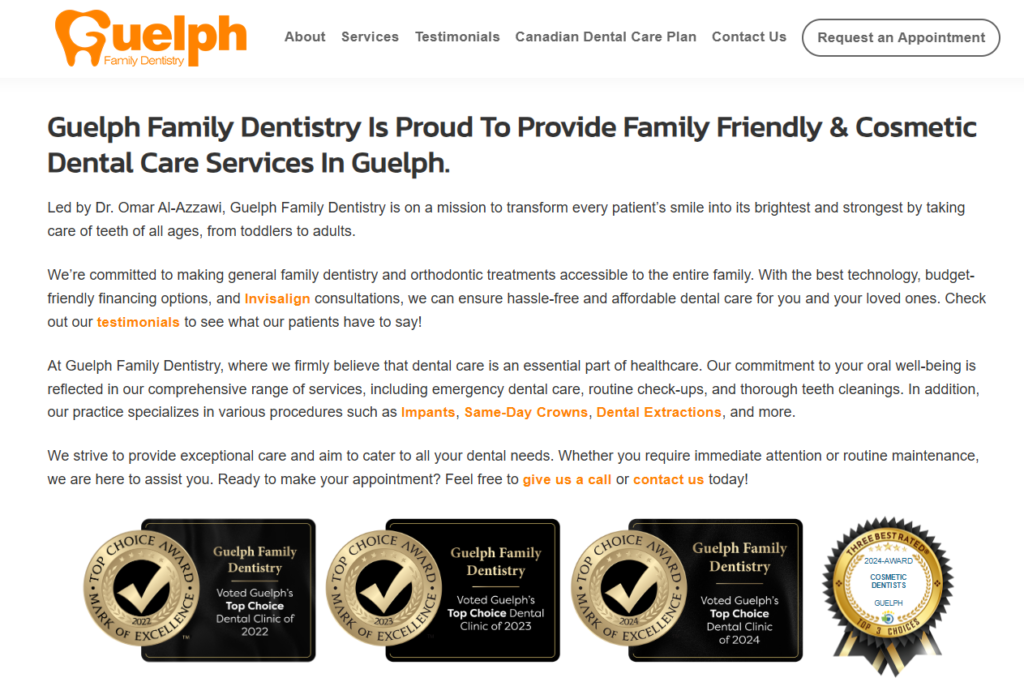
Many dental offices offer Invisalign services, but if your website features a Gold Invisalign Provider badge, it elevates your practice in patients’ eyes. It’s like someone saying, “I do gymnastics” vs. “I won a gold medal in gymnastics”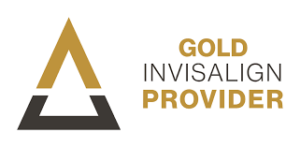
The vast majority of your potential patients are not doctors. They cannot evaluate your clinical skills. Writing a detailed bio about all of your training or featuring every designation you have isn’t going to impress 99.9% of patients because they don’t know (or care) what those letters after your name mean.
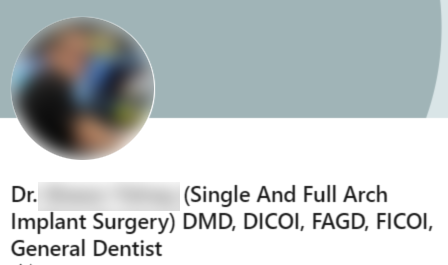
However, an award badge, especially from a recognizable company or publication (think Reader’s Choice Awards), carries significant weight.
How do you win local awards?
I’ll let you in on a little secret: the dental practices that win awards aren’t necessarily the ones providing the best dentistry; they’re just the best at asking their patients for votes and support. Your local newspaper that runs a Reader’s Choice Awards isn’t coming to your practice to watch how you place an implant. Winners are based on who gets the most votes.
If you’ve built a great reputation with your patients, send out emails asking for their support and vote. Nearly every local newspaper runs some kind of Reader’s Choice Awards program each year.
You have online awards like Three Best Rated with different categories to apply for, such as Dentist, Kids Dentist, or Cosmetic Dentist. Invisalign offers various badges depending on the number of cases you complete. Most patients don’t know how many levels there are or what they mean. Even featuring a Bronze or Silver badge can improve your website conversion rate compared to not showing any badge at all.
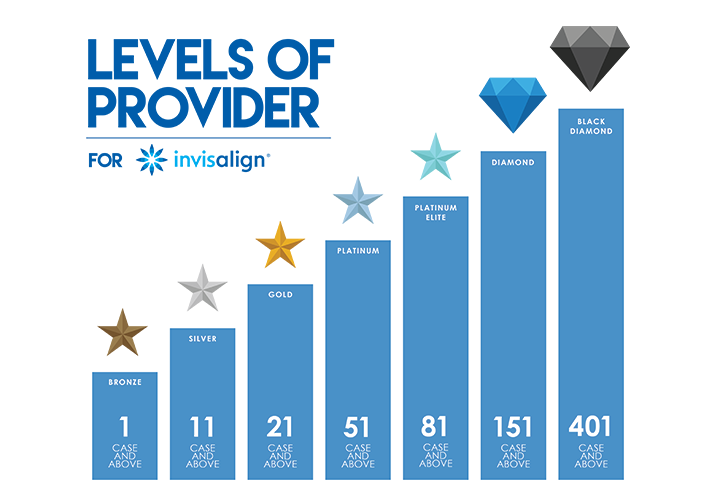
Like Google reviews and patient testimonial videos, winning awards comes down to organizing your staff to ask for your patients’ support. If you send out a generic blast asking patients to vote for your practice, you won’t see the same level of support and enthusiasm as when you and your staff personally ask for their help.
Winning these awards takes more effort than getting a Google review or a patient testimonial video, but it can have a significantly larger and more long-term impact on your practice’s ability to attract patients. By investing the time and effort to win these awards, you not only enhance your practice’s reputation but also build a strong foundation for sustained growth and success.
#4 - Educational Videos
When a patient searches for services like Invisalign or dental implants, they often find many dental practice websites offering these treatments. Typically, these websites provide a brief explanation of the service and a phone number to call for more information. Pretty standard and pretty boring.
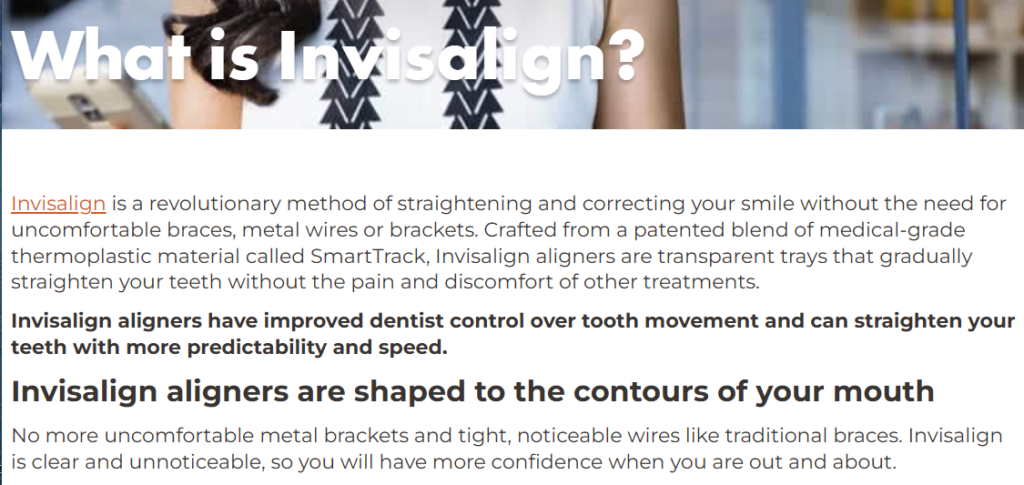
What many dental practices fail to understand is that the person didn’t visit your website to find out what Invisalign is or whether your practice offers it. What they’re really looking for is:
“Why should I choose your practice over the dozen other dentists that also offer Invisalign?”
Most websites don’t provide compelling reasons to pick their office over competitors. Google reviews and patient testimonial videos are great dental practice marketing strategy for offering reasons a patient should pick you, but there’s another powerful tool: educational videos.
20-30 years ago, people would flip through the Yellow Pages to find a service, read an ad, and call the number for more information. Today, people want to gather as much information as possible before making a call. Hearing “Sorry, we don’t give prices over the phone. You need to come in for a consultation” is a major turn-off. Consumer behavior has changed, and so have patients’ expectations. Practices that adapt to this change will thrive, while those stuck in the 1990s approach of “come in for a consultation” will be left behind.
Instead of forcing people to come in for a consultation, address the most common questions patients ask in quick educational videos.
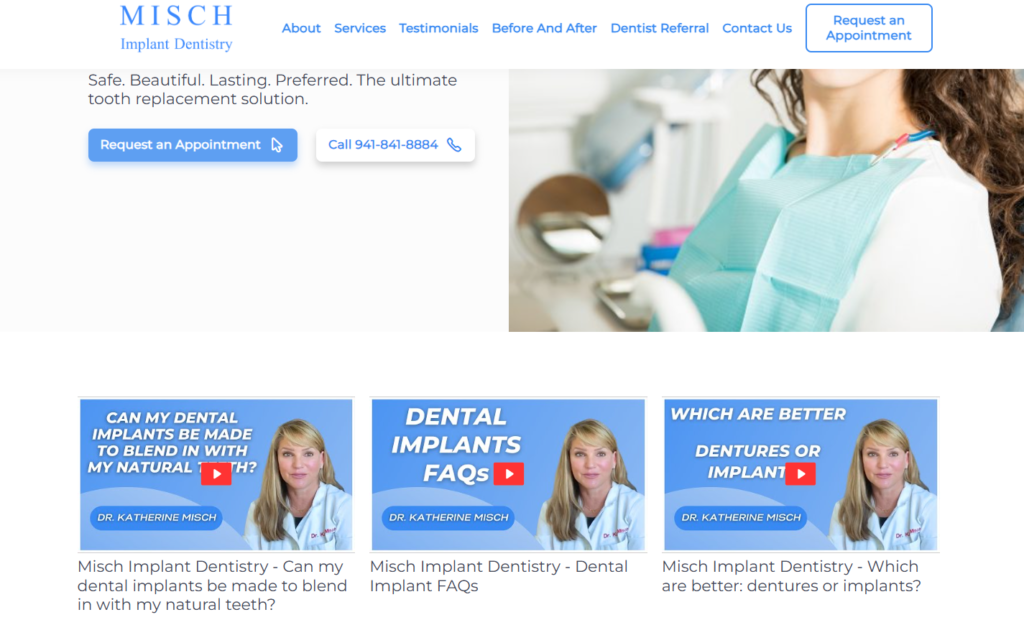
How do you create educational videos?
These videos are quick and easy to make, often requiring just a cellphone. Like patient testimonial videos, the goal isn’t high production value but genuine and authentic content. Think about the questions you and your staff answer daily. These can be turned into informative videos. For example, consider this video:
Sometimes it’s about explaining the process from start to finish, helping patients understand what to expect. Here’s another good example:
These videos provide immense value to patients searching for these procedures. They also give people a chance to virtually meet the dentist and the team, forming a positive impression.
If you’re looking for a major cosmetic procedure, which practice are you more likely to call? The one whose website says they do dental implants and asks you to call them, only to be told they can’t give any information over the phone? Or the practice that has created helpful videos explaining how dental implants work and how they perform the procedure?
These videos showcase the human side of your practice, demonstrating that your team is kind, knowledgeable, and helpful. They position your practice as an authority in the industry, making you the go-to choice for potential patients.
Think about the common questions you get in your office. Here are some examples:
- What does X typically cost?
- What will affect the price of the procedure?
- What happens if they don’t address this problem?
- Does X procedure hurt?
- Do they have to take time off work?
- How does X procedure compare to Y? (e.g., dental implants vs. dentures)
- How long does X treatment last?
- What causes X problem?
- What are the typical treatment options to fix X?
If you work in a dental office, a big part of your day is answering patient questions. You already know what to talk about. Keep a pad and paper handy and write down all the questions you get from patients each day that you’ve heard more than once. That pad will fill up quickly. These are the questions you should answer on video.
Tips for shooting educational videos
Just like with patient testimonial videos, you don’t need a fancy camera, expensive lighting, or a professional video editor. Here’s how to do it:
- Use Your Phone: Your smartphone camera is good enough.
- Shoot in a Well-Lit and Quiet Room: Ensure the area is quiet and well-lit. Avoid backlighting, like shooting with a bright window behind the subject.
- Simple Editing: Use free editing software that comes pre-installed on most computers to trim the beginning or end of the video if needed. If you’re not tech-savvy, hire a video editor on Fiverr for a small fee to polish the footage.
- Focus on Content: The goal is to make the video genuinely helpful and informative, not to create a highly polished commercial.
By addressing these common questions in a straightforward, authentic manner, you’ll provide valuable information that helps potential patients feel informed and comfortable. This approach not only showcases your expertise but also builds trust and positions your practice as a helpful and knowledgeable resource.
#5 - Organic Facebook Posts
Historically, we’ve been critical of Facebook marketing—not because it doesn’t work, but because it doesn’t work nearly as well as other paid platforms like Google Ads if you simply throw money at it hoping for new patient leads. Traditional Facebook ads often fall short in delivering a good return on investment compared to Google Ads.
However, there is a fantastic way to use Facebook marketing to drive more new patients that costs next to nothing: organic Facebook posts. If you and your team are willing to invest a little time, you can achieve great results.
When it comes to Facebook, most of the content dentists post are bland stock images with boring headlines or sales messages that nobody but the dentist (or the marketing company they hired to do this) likes or engages with. Here’s are some examples:
Common mistakes with Facebook posts
Most content posted by dental practices on Facebook consists of bland stock images with boring headlines or sales messages that fail to engage anyone. Here are some examples of low-effort posts that typically go unnoticed:


These posts are often created by marketing agencies hired to do “social media marketing” but they rarely engage anyone. What many practices don’t understand is that the more content you post that gets little-to-no engagement, the less likely your future posts will be seen by anyone. Facebook prioritizes engaging content to keep users glued to their platform. If your posts don’t engage people, Facebook won’t show them, and pretty soon, your posts will reach no one.


What Facebook posts actually work?
To get engagement, views, clicks, and ultimately patients, you need to post authentic and engaging content featuring your staff and patients. Here are some examples of what works:
- Staff Celebrations: Share photos of your staff celebrating birthdays, winning awards, or participating in fundraisers.


- Patient Experiences: Post pictures of happy patients, whether they’re coming in for their first appointment or enjoying their visit to your office.





If you want examples on highly effective Facebook post ideas that will get clicks, engagement, and new patients in the door, check out our free 2024 Social Media Strategies To Drive New Patients guide with over 100 pages for post ideas you can replicate in your practice.
#6 - Search Engine Optimization
One of the best dental practice marketing strategies that remains to this day is Search Engine Optimization (SEO). It continues to be one of the best ways to attract new patients to your practice because Google remains a primary method for patients to find dental offices. However, it’s important to remember that while SEO can increase your website’s visibility, patients won’t call your practice solely because it ranks at the top of search results.
Using the Amazon example again, if you search for a pair of headphones, you’re unlikely to buy the first pair just because it’s at the top of the page. You’ll probably check out a few options, look at product pages, read customer reviews, and maybe even watch in-depth reviews on YouTube. The same behavior applies to patients searching for a dentist. Ranking well for terms like “dentist near me” will increase visibility, but patients will likely visit several websites before deciding whom to call. If your website features great reviews, patient testimonial videos, local awards, and educational videos, it will significantly increase the chances that patients choose your practice over competitors.
This is why Facebook and SEO are most effective when combined with the other elements we’ve covered earlier.
How to make your practice can rank better on Google
Google considers hundreds of factors when ranking websites, which can be overwhelming if you’re not familiar with digital marketing or web design. Terms like LSI keywords, domain authority, backlinks, and schema markup may sound like gibberish, which is why many dentists hire SEO marketing professionals.
However, improving your dental website’s rankings isn’t as complicated as many marketing companies make it seem. Many tasks can be done by you and your team. Unless you’re in a highly competitive city with hundreds of dental practices, you can achieve substantial improvements on your own and outperform most other offices in your area.
Check out our 5-part Dental Practice SEO series on YouTube to learn the basics.
Learning the fundamentals yourself is a great way to start. Even if you eventually hire an SEO company to take things to the next level, you’ll have more knowledge about how SEO works than most dentists, allowing you to discern who truly knows their stuff and who is just selling snake oil.
SEO is a critical component of a comprehensive dental marketing strategy. By understanding and implementing basic SEO practices, you can enhance your online visibility and attract more patients. Combining SEO with engaging content, patient testimonials, local awards, and educational videos will make your practice stand out and convert more visitors into patients. Start with the basics, and as your understanding grows, you’ll be better equipped to make informed decisions about hiring professional SEO help, ensuring your practice stays ahead in a competitive market

